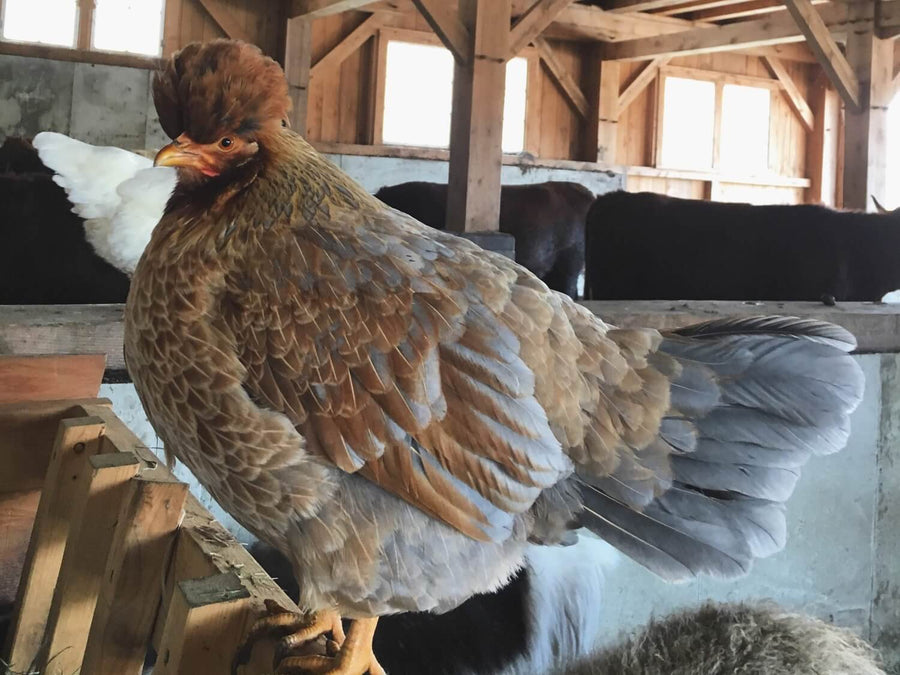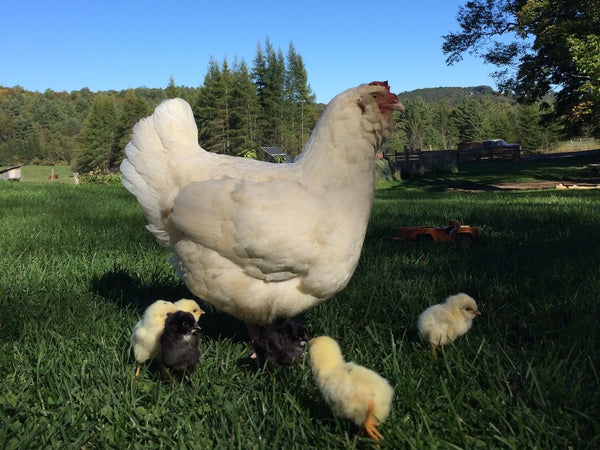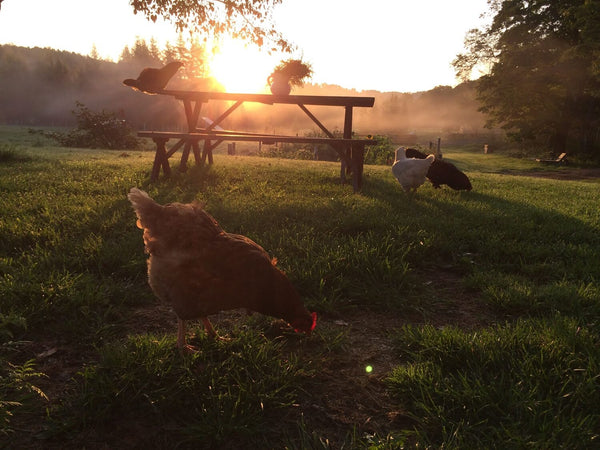

How to choose a chicken breed
Once you have secured permission from your local community and governing bodies, you are in a good position to consider which of the many chicken breeds you would like to raise. There are nearly as many breeds of chickens as there are flavors of ice cream, and like ice cream, you have options ranging from artisanal to conventional flavors. There are hens bred specifically for:
- Egg-laying production
- Hardiness
- Size of bird (both large and quite small)
- Egg color
- Demeanor and docility
- Exotic plumage and colors
- Flexibility of purpose

Best chicken breeds for egg-laying production
Production may seem like an obvious quality to look for in a backyard hen, and one of the very few minimal requirements you may have. But of course, there are those that lay better than others, and deciding how important this quality is to you will depend on your egg needs. For example: Pete & Gerry's predominantly raises breeds called Bovans Browns and Hylines; their goal is to make high quality eggs available nationwide, so their egg needs are quite high, which means that prioritizing this quality.
The best chicken breeds that are known for their reliable laying include:
- Bovans Browns
- Hylines
- Australorps
- Leghorns
- Orpingtons
- Rhode Island Reds

Chickens best for hardiness
Chickens originated in the jungles of Southeast Asia, and as a result, they're accustomed to a more temperate way of life than most birds. But since the domestication of the species around 7000 BC, chicken keepers have been breeding birds for hardiness so that they may also thrive in Northern climates. For this very reason, the Icelandic chicken is a popular breed among chicken enthusiasts, as are Silkies, Barred Plymouth Rocks, and Wynadottes, to name a few. By contrast, light-colored chickens like the Fayoumis and Brahmas are well suited for desert climates.
Chickens bred for colder weather include:
- Silkies
- Barred Plymouth Rocks
- Wynadottes
- Fayoumis
- Brahmas
Best large chicken breeds
The chicken is, by nature, an animal destined to the mercy of the predators that surround it. The larger the bird, the less enticed a hawk, owl, or even a fox may be. Large breeds do eat a considerable amount of food, and this should be taken into serious consideration. Breeds generous in size include Jersey Giants, Cochins, and Orpingtons. Small chickens are wonderful for smaller set ups. If you don't have much space, you should consider bantam hens, known also as miniatures, which are about one quarter the size of a regular chicken. They lay eggs that are smaller too, but still edible and delicious.
Large chicken breeds include:
- Jersey Giants
- Cochins
- Orpingtons
Best chicken breeds for egg color
Eggs are no longer limited to the soft brown and snow-white hues that dominate the majority of the egg aisle. Thanks to industrious home breeders, there is a veritable rainbow of colors available. Chicken egg colors can range from blues and greens to chocolate browns. If selected carefully, your family will be admiring the baskets of eggs that come out of the coop. The Araucanas, Ameraucanas, and Cream Legbars are the most traditional selections for blue eggs. Welsummers, Marans, and Barnevelder chickens lay chocolate brown eggs.
Chicken breeds that lay blue eggs:
- Araucanas
- Ameraucanas
- Cream Legbars
Chicken breeds that lay chocolate brown eggs:
- Welsummer
- Marans
- Barnevelder
Chicken breeds that lay green eggs:
- Easter Eggers
- Olive Eggers
Chicken breeds that lay pink eggs:
- Barred Rock
- Light Sussex
- Asil

Best Breeds for demeanor and docility
If you have kids who will be collecting eggs and assisting in chores, you want to be sure your hens are docile. Docile chickens are less likely to peck or chase children (and adults). That being said, chickens of all breeds will likely be docile if treated kindly and gently from an early age. To be extra careful though, breeds like Silkies and Buff Orpingtons are particularly known for their gentle manners.
Chickens bred for docile demeanor:
- Silkies
- Buff Orpingtons

Best breeds for exotic plumage and color
Birds have long been raised by humans as a form of appreciation for their colorings and fantastical plumage, and chickens are no exception. Polish chickens come with funny crested hats atop their curious heads, while Silkies are very fluffy and handsome.
Chickens bred for exotic plumage and color:
- Polish Chicken
- Silkies
Best breeds for laying eggs and providing meat: dual purpose
Chickens are typically raised either for their breast meat or for their eggs. If you decide to raise backyard chickens it most likely will be for the purpose of having fresh eggs. Chickens raised for eggs are edible, but their breast is lean and their meat dark, which most North American palettes aren't used to.
In cultures outside of North America, it is still common to harvest both meat and eggs from the same flock of hens. These birds are known as dual purpose and chief among them are the Speckled Sussex and the Rhode Island Red.
Chicken breeds for egg laying and meat:
- Speckled Sussex
- Rhode Island Red
When it comes to breeds, while the possibilities are endless, navigating them is not a prerequisite for chicken ownership—merely extra credit. So long as you have healthy hens that you can keep safe from inclement weather and predators and provide space to roam, peck, and scratch, you will be rewarded with baskets full of fresh, backyard eggs.
Ready to purchase your chicks? Read on for advice on finding and choosing a hatchery to source your birds from.
A note from Pete & Gerry's: For generations, our family of farmers at Pete & Gerry's Organic Eggs has been dedicated to revolutionizing the way eggs are produced in the United States. We believe that consumers deserve better eggs from happier chickens living on small farms run by fairly paid farmers, and that's what we have dedicated our business to. We also believe deeply in the transparency and verification of our standards, which is why we became a Certified B Corporation in 2013. It's also why our farms meet the rigorous Certified Humane Free Range and USDA Certified Organic standards. We take the welfare of our hens, the sustainability of our farms, and health and happiness of our partner farmers and consumers very seriously. The resulting eggs are ones that stand out in the supermarket; they remind consumers of the eggs from their childhood farms and excursions abroad in Europe. And we're happy to be second best. In fact, we believe that everyone deserves a chance to raise hens right in their backyard and experience the joys that come with raising and growing food at home. Kate MacLean of Longest Acres Farm is here to tell you how.

Kate MacLean lives and works on 120 acres of land known as Longest Acres Farm in Chelsea, VT with her husband Nick, son Leland, and daughter Amelia. As an ex-city-dweller, she gained valuable experience working on friends' and neighbors' farms before making the move to rural Vermont with her family in search of a fulfilling, self-sustaining way of life.
Her breadth of experience in farming and raising countless varieties of chickens and other livestock on Longest Acres Farm not only makes Kate an expert in her field, but an advocate for home grown food and self-sustainability.










